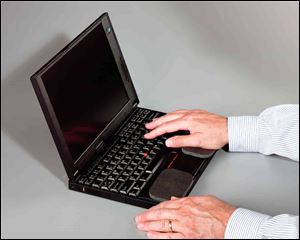
Wrists overworked? Try work breaks
Also take some time to ice the pain
7/2/2012
Repetitive hand motion, such as typing, can cause carpal tunnel.
Maybe your wrists and fingers swell when you leave work. Or maybe they ache or go numb in the middle of the night.
Sounds as if you've been messing with your carpal tunnel -- that tiny tunnel in your wrist where the median nerve, flexor muscles, and flexor tendons travel en route to your hands and fingers to make them open and close.
If you're a keyboard jockey, dental hygienist, factory worker, or someone else who has been keeping your hands busy with repetitive motions or holding them for long periods in positions other than flat, you may have carpal tunnel syndrome.
"That tunnel is very, very tiny. ... So when there's swelling around the tendons, it fills up the space and causes pressure," says Debbie Amini, an occupational therapist and member of the American Occupational Therapy Association in Bethesda, Md. "And that puts pressure on the median nerve so the nerve can no longer get nutrition from its blood supply.
"People who use their hands and their fingers a lot -- like typists -- can overuse those muscles to the point they become inflamed," she says.
Other factors that can cause those hand muscles and tendons to swell, says Ms. Amini, whose expertise is hand rehabilitation and occupation-based hand therapy: working with very tiny instruments or vibrating machines, holding a pinch, or keeping your hands in extreme positions, bent forward or backward.
"If your hand is lying flat and you bend your wrist with the fingers pointing to the floor or if you point your fingers toward the ceiling, it's basically the extremes of either of those positions that increases the pressure," adds Ms. Amini, the director of the occupational therapy assistant program at Cape Fear Community College in Wilmington, N.C. "If somebody constantly has their hands in one extreme or the other, it's enough to cut off the blood supply to the nerves so the person can develop carpal tunnel syndrome."
This wasn't a big deal when people were pecking away at typewriters?
"People typing on the typewriter had to stop and move their hands in many different ways. They had to stop and return the carriage or put in a new piece of paper," says Ms. Amini. "The problem now is that you can sit on a computer and never, ever leave."
To prevent or minimize carpal tunnel issues related to work, she suggests:
● Take a break: Try at least five minutes each hour "if you are working at a repetitive task with no natural stopping point or is not comprised of multiple types of movements." No need to decrease productivity; open mail, organize files.
● Be proactive: "Do not wait until you begin to have symptoms."
● Check it: Don't hold your hands in exaggerated positions for long periods of time. It exacerbates carpal tunnel fatigue.
● Position: "Straight across with hands and wrists in alignment as much as possible."
● Ice it: Hands hot and swollen after work? Put ice packs on for 20 minutes. "If you haven't been to a doctor to know exactly what is causing the problem, then ice is probably safest." Also, ice it right: "Make sure there's some type of towel material between the ice pack and your skin." Never apply ice directly to your skin.
● Try an over-the-counter splint: "It holds the wrist straight and keeps the blood flowing well to that nerve." Some wear them while doing the activities; others wear them while sleeping at night.
● Avoid heat: "If [it's] an inflammation problem, don't add heat because that simply increases the inflammation."
● Stretch and shake: Stretch your neck, shoulders, and all the way down to your hands. "Shake them out. ... It's not going to be a cure, but it gets your circulation going, gets those tendons out of that constant repetitive mode they're in."
● See a doctor if pain or numbness in your hands and wrists "wakes you up at night or you're starting to see changes in your ability to function or you start to feel like you're dropping things."